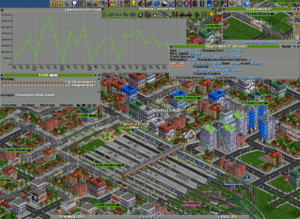Business simulation game

 |
| Part of a series on |
| Simulation video games |
|---|
Business simulation games,[1][2] also known as economic simulation games[3][4] or tycoon games, are games that focus on the management of economic processes,[5] usually in the form of a business. Pure business simulations have been described as construction and management simulations without a construction element,[2] and can thus be called simulations.[2] Indeed, micromanagement is often emphasized in these kinds of games. They are essentially numeric, but try to hold the player's attention by using creative graphics.[2] The interest in these games lies in accurate simulation of real-world events using algorithms,[6] as well as the close tying of players' actions to expected or plausible consequences and outcomes.[6][7] An important facet of economic simulations is the emergence of artificial systems, gameplay and structures.[8]
There are many games in this genre which have been designed around numerous different enterprises and different simulations. Theme Park can be called a business simulation because the goal of the game is to attract customers and make profits, but the game also involves a building aspect that makes it a construction and management simulation.[2] This genre also includes many of the "tycoon" games such as Railroad Tycoon and Transport Tycoon. Another similar example of a business simulation (that models a startup business) is "SimVenture Classic".
Active development of Internet technologies and the growth of the Internet audience in recent years gave a powerful impetus to the development of the industry of online games, and in particular, online business simulations.[11] There are many varieties of online business simulations – browser-based and downloadable, single-player and multiplayer, real-time and turn-based. Some online simulations are aimed primarily at the leisure market while others have real world applications in training, education and modelling.
Real-world applications
Because
History
This section needs expansion. You can help by adding to it. (January 2017) |
An early economic sim by
See also
References
- ^ a b Review – IGN: Trevor Chan's Capitalism II
- ^ ISBN 1-59273-001-9. Archived from the originalon 2008-09-15. Retrieved 2008-05-23.
- ^ IGN: Air Bucks,
- ^ News – IGN: Big Biz Tycoon Ships
- ^ Rollings, Andrew; Ernest Adams (2006). Fundamentals of Game Design. Prentice Hall.
- ^ ISBN 1-58450-090-5.
- ISBN 0-8077-4675-4.
- ISBN 1-56881-297-3.
- ^ IGN: Joan of Arc Interview
- ^ "Capitalism Lab – Taking Business Simulation to a New Frontier".
- ^ a b Online Business Simulations
- ISBN 978-1-57387-275-1. Retrieved 2008-06-18.
- ^ ISBN 1-56090-041-5.
- ISBN 978-90-5199-353-0.
- ^ ISBN 1-4129-0033-6.
- ^ ISBN 0-7494-2872-4.
- ^ ISBN 3-540-66979-5.
- ISBN 0-226-34860-1.
- ISBN 981-238-167-8.
- ISBN 978-1-350-06664-9.
- 1UP.com. Archived from the originalon 2009-03-06. Retrieved 2008-06-18.
- ISBN 0-07-223172-6.
- ^ http://www.mobygames.com/game/oil-barons MobyGames. "Oil Barons," (retrieved on January 25th, 2009).
